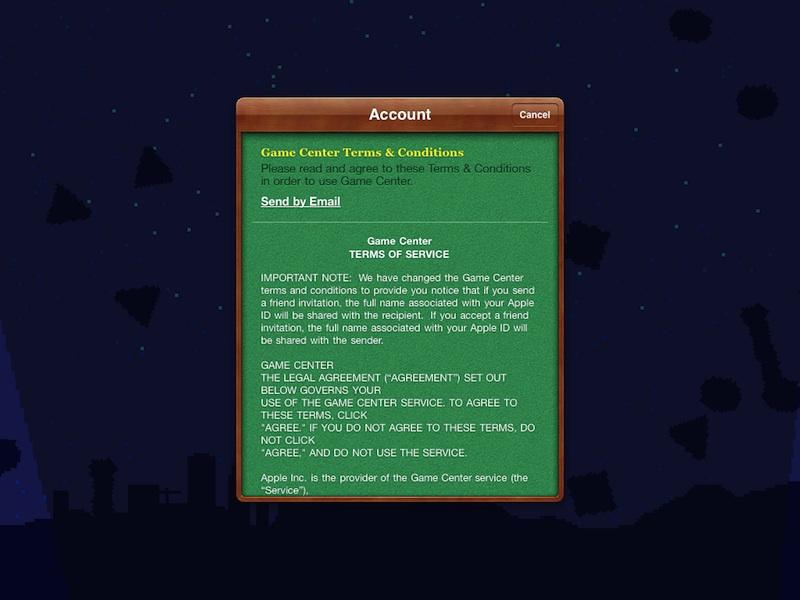Apple amends iOS Game Center to use real names in invites
iPhone and iPad games that support Game Center typically connect to your account automatically at launch to enable features such as multiplayer support, high score leaderboards, and the ability to invite friends to play with you.
However, yesterday Apple issued an update that prompts users to first agree to the new ToS, which includes the comment, "we have changed the Game Center terms and conditions to provide you notice that if you send a friend invitation, the full name associated with your Apple ID will be shared with the recipient. If you accept a friend invitation, the full name associated with your Apple ID will be shared with the sender."
Good for casuals, bad for the serious
For the casual games and game players Apple has attracted to its platform, the change will likely be a positive one, as it enables invited players to actually see who is inviting them to play, rather than only showing that person's selected gamer identity, which might likely be cryptic and unfamiliar to the recipient being invited.
However, some self styled "serious gamers" are taking issue with the change, complaining that— at least in the hard core gamer community represented in circles such as "World of Warcraft" or Xbox Live— gamers take their anonymity seriously and don't want to be "outed" in their game invites with gaming friends, who may only be friends in the gaming world.
Some female players, for example, choose to hide their gender to avoid being treated differently by the predominantly young male players typically found in serious gaming circles. Other players may hide their identity in online games to avoid being called out for playing at work by their supervisors.
Of course, users who are afraid of revealing their identity within Game Center at all (or for that matter iTunes reviews or Apple's Ping social network) can change the real name associated with their Apple ID to an alias, or create a secondary Apple ID exclusively for use with Game Center.
Apple brands iOS a family friendly platform
Whether Apple's family-friendly iOS platform will actually suffer any actual repercussions from the change seems unlikely. Users continue to appear in public high score leaderboards only under their chosen gamer identity; real names are only exchanged in gaming invites between friends.
However, the move does align Apple more firmly into the casual gamer community, and harmonizes with the company's decision to bar extreme graphical violence, crude language, and even rather tame sexual content. In that respect, Apple is aiming to deliver a platform more like that of kid-friendly Nintendo, and less like Microsoft's Xbox 360, where violence and sexuality are used to attract the teenage male demographic of "hard core gamers."
Interestingly, Microsoft has followed Apple's lead toward family-friendly software aimed at the mainstream with its new Windows Phone 7. Developers such as Justin James have already started to complain that Microsoft's "application guidelines are almost as bad as Apple’s. The number of things that are forbidden is quite large,"
James, the same WP7 developer who reported that Microsoft wasn't revealing software app sales and was holding up developer payments till February 2011, noted that despite Microsoft's efforts to "leverage the skills of Xbox and other XNA developers," its Apple-like rules on acceptable content "undermines the positioning of the [WP7] phone as a consumer device," because "the guidelines prohibit many of the things that are quite common in video games. For example, much of the gore that has been commonplace in games is prohibited, as is excessive use of explicit language and content of a sexual nature."
Gamers vs families
Apple's decision to avoid controversial content in the iOS App Store does not seem to be causing it any problems outside of criticism from ideologues fretting about the company's censorship. Apple has resisted bending to such criticism, with company chief executive Steve Jobs describing the iPhone as having two available platforms, one, the App Store curated by Apple, and the other, the entirely free and open web accessible via the browser.
Some observers have criticized Apple's highbrow stance by suggesting that platform supremacy has often paralleled access to pornography, citing the war between Sony's BetaMax and JVC's copycat, but less restrictive, VHS format.
Nintendo itself lost ground dramatically in the sixth generation of game consoles, when its GameCube fell behind Sony's PlayStation 2, arguably in large part because it failed to attract buyers outside of the very young demographic and lacked first person shooter titles such as "Grand Theft Auto," a controversial title involving sexualized content and graphic violence.
At the same time, there are even more examples of failed software platforms that offered little restrictions on content. The Atari 2600 enabled a glut of video games including titles purporting to be violent and pornographic, but a lack of curation over content and particularly quality control spelled its demise. Nintendo introduced what is perhaps the first attempt to regulate a platform's software, and has been successful across more generations of games consoles than any other company.
Nintendo's Wii is a particular stand out success, given that it has kept up and often surpassed unit sales (and certainly the profits) of much more sophisticated consoles from Sony and Microsoft, largely due to its focus on all-ages, family friendly titles as opposed to graphically intense, boundary-pushing single player games, which are often intended to be played with other remote players the gamer does not necessarily even know.
 Daniel Eran Dilger
Daniel Eran Dilger











 Malcolm Owen
Malcolm Owen
 Chip Loder
Chip Loder

 William Gallagher
William Gallagher
 Christine McKee
Christine McKee
 Michael Stroup
Michael Stroup
 William Gallagher and Mike Wuerthele
William Gallagher and Mike Wuerthele







